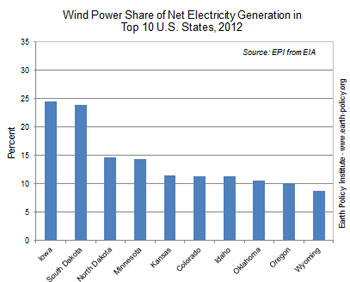Electric bills are trending down for people that live in high-wind states, according to research by the American Wind Energy Association (AWEA).
The 11 states that get more than 7% of their electricity from wind energy have seen their electric prices decrease by 0.37% over the past five years, in contrast to all other states, where electricity prices have increased 7.79% during that time.
The 11 states are: Texas, Wyoming, Oregon, Oklahoma, Idaho, Colorado, Kansas, Minnesota, North Dakota, South Dakota, and Iowa.
Texas is on the verge of getting 10% of electricity from wind; Iowa and South Dakota already get 25%.
The more wind capacity they have, the more rates have come down.

But don’t AWEA’s word for it – at least 15 studies confirm that as wind energy increases, electric prices come down. Studies have been done by independent grid operators, state governments, academic experts, and others.
For example, research from New England’s grid operator concludes that when wind provides 14% of electricity, prices drop 10%, and when it reaches 24%, prices decline 15%. Find the links to these studies in AWEA’s white paper, Wind Power’s Consumer Benefits:

This is the most feasible option for all energy,Green city,Energy for rural islands,Electricity Sector at a Glance http://ow.ly/t0U8e
– Do not forget there is one extremely effective method for renewable energy ,No damage landscape , environmental . I have 1 initiative has the potential ,unlimited energy ,despite inclement weather,can be placed anywhere ,work 24/24 According to the new model, wind energy,no need wind outdoors, Effective Immediately, no longer any cost .No need storage systems. Do not interrupt energy any situation
Wind power shall be encouraged in windy states because it reduces carbon emission and offers cheap energy during windy days. The whole sale real time elctricity price in ERCOT(Texas)sometimes offers negative price when high wind power is generated. The yearly average prices has been reduced by a lot due to wind power in last few years. However, when wind is less, it needs
peaking units to pick up the load; and rate payers pay more.
MISO wholesale prices have dropped yet in MI and OH retail rates have risen substantially. You can only parasitize the revenue stream of wind’s requisite gas-fired generation for so long before it is no longer economically viable. Duke Energy’s CEO said so just this week, despite Duke being a substantial wind developer. Wholesale price suppression would be far higher if we gave gas generators a production tax credit like wind get’s now. The PTC is roughly equal to the wholesale value of electricity. If we subsidized Japanese cars at the wholesale rate of their manufacturing costs car prices would drop as well. But the Big 3 would be in serious trouble. But at least a Japanese car does the same thing an American car does: reliable and safely transport people. But wind cannot replace gas or coal generation. It is simply an expensive fuel saving accessory for fossil generators. If all gas and coal close, wind is done too. It is a host/parasite relationship.